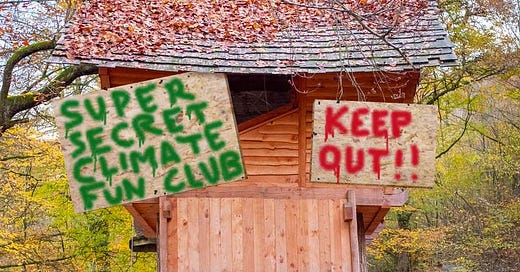Europe Will Exclude Us From Super Secret Climate Fun Club Over My Dead Body
Exciting, boring things are happening in the world of global climate policy
When I was at EPA, I developed a cynicism for climate change “commitments”. Many of the speeches I wrote patted a city or corporation on the back for making an easier-said-than-done commitment that might happen or might not. We’d go to West Birkenstock, New York, population 8,000-well-off-retirees-and-three-high-school-kids-who-couldn’t-wait-to-leave, and meet their very-friendly Earth Mother mayor, and we’d act like West Birkenstock had cured polio (again!) by promising to cut water usage by 20 percent by 2450.
I’m exaggerating, of course. But only a bit; some commitments were laughably vague. And I don’t want to completely sneer at the concept of commitments, because sometimes they increase political pressure to take real action. And not all commitments are distant and unenforceable. But the point stands: It’s easier to make the commitment than to actually do the thing.
The Paris Accord is nifty, but toothless. We already had one major world leader (ours) say “nah, screw this”, and there wasn’t much the world could do. Or, at least: There wasn’t much that they did do. But all of a sudden, the politics of global carbon reduction seem to be changing. And by “all of a sudden”, I mean “within the last few days”. It’s been pretty remarkable.
You might have seen a headline like this one from NPR on Wednesday:
Could a headline possibly be more boring than that one? Key words include “Europe” -- I’m already drowsy; "plan” -- so there’s reading involved, great; and “imagines” -- so this isn’t anything that has actually happened. This is, like, the EU president describing a dream she had, or members of the European Commission joining hands and singing John Lennon’s Imagine, yes?





